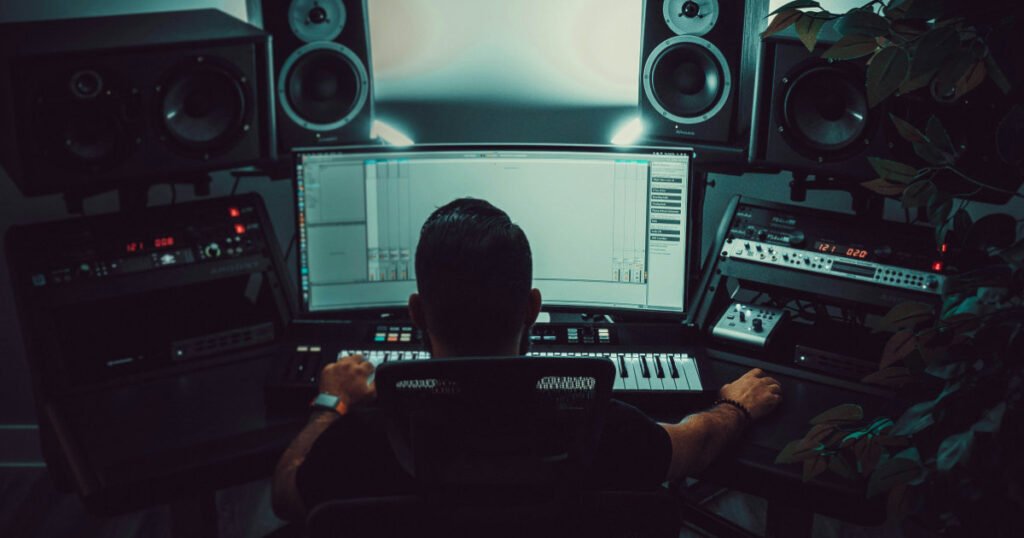Film Music Composition Techniques


Great, I’ve got the details for the article. Let’s dive into composing music for film in post-production. This is a topic that’s always buzzing in our community, especially among those who are either dabbling in film scoring or are already deep in the trenches of soundtrack creation.
The Art of Film Scoring: An Overview
When it comes to film scoring, we’re talking about an art form that’s both exhilarating and demanding. Picture this: you’re painting emotions and enhancing narratives, but with music instead of a brush. It’s about creating an audio landscape that complements the visuals on screen, adding depth and dimension to the storytelling. It’s not just about composing beautiful music, but about making sure that music tells a story, connects with the audience, and fits seamlessly with the film’s pacing and mood.
Now, every film composer’s journey is unique, but there are some common threads. Understanding the director’s vision is crucial – it’s the compass that guides your musical creation. You need to be adept at translating narrative and emotional cues into melodies and harmonies. And, of course, there’s the technical side: knowing your way around different musical styles, being comfortable with both traditional orchestration and digital audio workstations, and having a solid grasp of timing and synchronization with the film’s scenes.
Key Techniques in Music Composition for Film
Diving deeper into music composition for film, it’s all about storytelling through sound. You’re not just writing music; you’re sculpting emotions and atmospheres. To do this effectively, you need a mix of creativity and technique. For instance, leitmotifs – recurring themes associated with specific characters or ideas – can be a powerful tool. Think about how iconic film scores use these motifs to bring characters to life and evoke emotions from the audience.
Another critical aspect is understanding the narrative structure of the film. Is the scene you’re scoring a high-tension chase or a tender romantic moment? The music needs to match the pacing and tone. This often involves a lot of back and forth with the film’s director and editor to ensure that your compositions enhance rather than distract from the on-screen action. And let’s not forget about instrumentation and arrangement – choosing the right instruments and their interplay can make or break a film score.
Soundtrack Creation: Tools and Software
In today’s world, soundtrack creation is as much about the tools as it is about talent. Gone are the days when you needed a full orchestra at your disposal. Now, a laptop and the right software can get you pretty far. Digital audio workstations (DAWs) like Logic Pro, Pro Tools, and Ableton Live are essentials in any film composer’s toolkit. They offer incredible flexibility, allowing you to compose, edit, mix, and master your scores, often with stunningly realistic virtual instruments.
But let’s not underestimate the power of real instruments and live recordings. Sometimes, the authenticity and feel of live musicians can’t be matched by digital samples. This is where software like Sibelius or Finale comes in handy, allowing you to write and arrange scores that can be played by live musicians. And remember, it’s not just about having the tools – it’s about knowing how to use them effectively to bring your musical vision to life.
Tips and Tricks for Aspiring Film Composers
For those starting in film scoring, the journey can seem daunting, but it’s also incredibly rewarding. Here’s a tip: start by studying your favorite film scores. What makes them effective? How do they enhance the film’s narrative? Analyzing and understanding these can be hugely educational. Also, don’t be afraid to experiment. Film scoring is an art, and like all art forms, it thrives on innovation and personal expression.
Networking is also key. The post-production industry is tight-knit, and connections can open doors to opportunities. Participate in online forums, attend industry events, and don’t shy away from collaborations. And most importantly, practice, practice, practice. Like any skill, composing for film gets better with experience. So keep at it, and don’t get discouraged by the inevitable bumps along the road.
Stepping into the world of film music composition is like embarking on an epic journey. It’s filled with challenges, but the satisfaction of seeing your music breathe life into a film’s narrative is unmatched. Whether you’re an aspiring composer or already in the thick of it, remember, every film score you create is your signature, your contribution to the art of filmmaking.
Looking to dive deeper into the world of post-production? How about exploring ways to optimize your audio post-production workflow? It’s a game-changer, ensuring your scores not only sound great but are also efficiently integrated into the final film product. Discover the secrets to streamline your audio post-production and elevate your work to the next level.

Responses